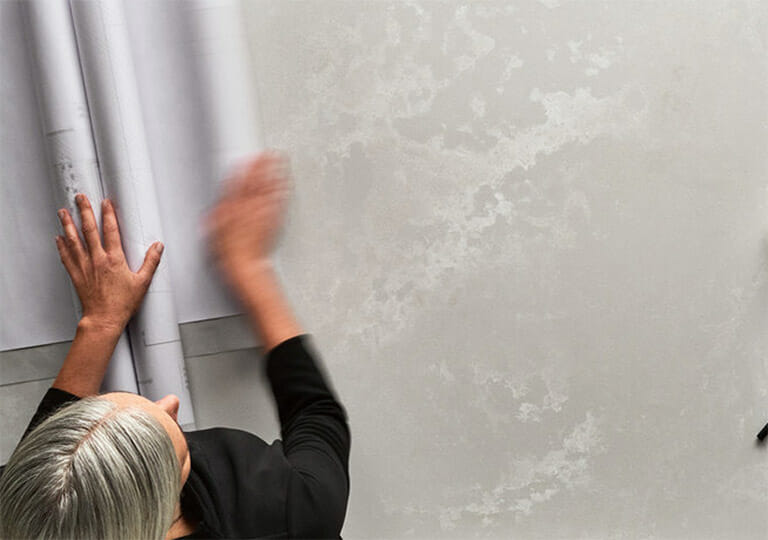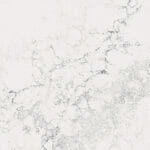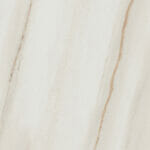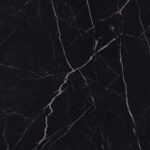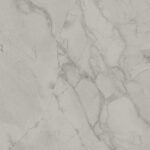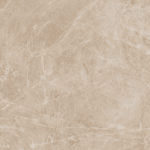White marble has been known as a luxury building material for years. But are white marble countertops a good idea for modern kitchens?
In this post, we’ll answer these questions and more. You’ll learn everything there is to know about white marble as a countertop material, which will help you make an educated decision for yourself.
We’ll also tell you how to achieve the marble look with quartz countertops.
Types of White Marble Countertops
When most people envision “white marble,” they’re thinking of Carrara, which ranges from a bluish-gray to pristine white. Carrara’s veining is fairly subtle and gray in appearance.
This is just one type of marble, though.
Calacatta is another fairly common type of white marble. It’s much brighter, with thicker veins, and can come in darker hues like brown.
Next, you have statuary marble. You’ve almost certainly seen a sculpture made from this type of marble (Michaelangelo’s iconic David is one of them). It is a highly contrasting stone, with dark veining that looks striking against its otherwise stark white surface.
To the untrained eye, these types of marble may look identical. In reality, it’s important to know the distinction if you’re serious about interior design.
What is Marble Veining?
The term ‘veining’ refers to the non-white streaks and specks in marble. Marble, like most natural stones, comes from a quarry. Each quarry exists under different conditions. A quarry’s composition will determine how the veining occurs.
It goes like this.
Water deposits minerals, then when the water evaporates, it leaves behind some trace amounts of those minerals in the stone. That produces the tree branch-like phenomenon known as veining.
While veining is beautiful, it does pose a number of challenges for designers. We’ll go into this in greater detail shortly.
Cost of White Marble Countertops
There are several prohibitive factors associated with this type of natural stone. Perhaps the greatest of these (worthy of its own section) is the cost of white marble countertops compared to other materials. Marble can cost between $40 and $200 per square foot.
That’s just the material, though. Many other factors affect the cost of white marble countertops, such as the desired shape, number of pieces, and whether or not you want a custom color.
You really don’t want to cheap out on the material, either, since poorer quality marble may look unsettling due to seams and mismatched veining.
Pros and Cons of White Marble Countertops
Now that you understand the basics, let’s take a close look at the pros and cons of having white marble countertops in your kitchen.
Pro: White Marble is Beautiful
There’s a reason some of history’s greatest sculptors have used marble for their creations. It’s a stunning material that exudes luxury and quality. White marble also pairs well with several kitchen themes. From contemporary to traditional, it has the ability to blend in with just about everything.
Con: That Beauty Costs a Lot
As mentioned earlier, you really don’t want to skimp on your white marble countertops. With cheaper varieties, the veining often does not line up where two pieces of white stone meet. This ruins the look of your kitchen countertops and makes designs such as marble countertops prohibitively expensive.
Pro: Marble Has Maintained its Value Better than Granite
Granite has experienced a popularity decline more drastic than any other countertop material. White marble countertops have taken a hit as well but they haven’t fared as badly as granite. As such, you can expect marble to perform better than granite as far as increasing your home’s resale value.
Con: White Marble Countertops Need Constant Sealing
Perhaps the biggest inconvenience that white marble countertops in the kitchen present is the need for regular resealing. Like many types of natural stone, white marble will stain if you don’t reseal it regularly. Depending on the stone’s quality, you may need to reseal it as often as four times per year. That adds up, both financially and in terms of your time.
If your white marble does stain, you’re likely in for a costly repair.
Pro: Marble Offers a Unique Look
Marble is not a rare stone by any means. However, no two pieces of marble are exactly the same. This is a plus for homeowners who like having something they know to be one-of-a-kind.
Con: Marble Gets Weaker with Time
As permanent and monumental as Michelangelo’s carved marble David looks, its custodians have put tremendous effort into maintaining it. They even embedded small fiber optic sensors into it so they could monitor how the statue is holding up.
Despite this, David has decayed and is in constant threat of cracking. Both of these are properties of white marble. Granted, you’re probably not concerned with keeping your countertop in tip-top shape for 500+ years. Nonetheless, all marble will begin to show signs of aging and wear within a much shorter time frame. If you’re not okay with this (and many homeowners aren’t), you’ll need to spend money maintaining the surface and repairing issues as they pop up.
Why People Prefer Quartz Countertops
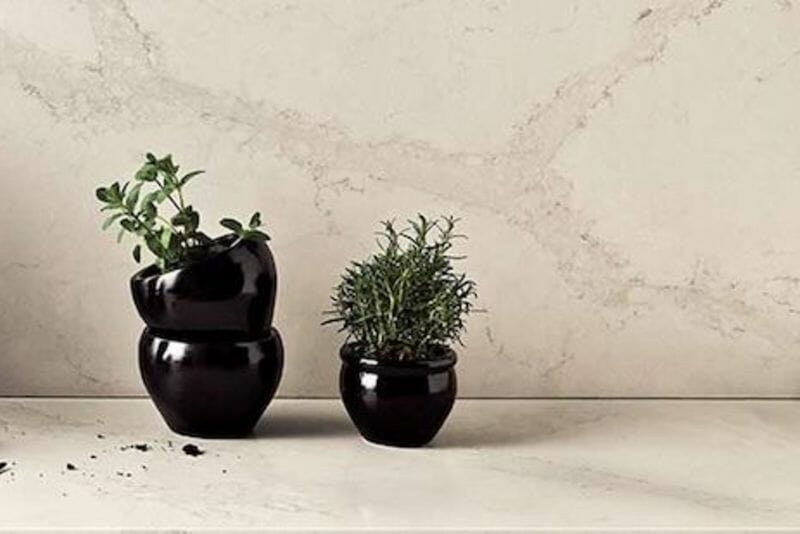
Now that you know the pros and cons of white marble, let’s explore why quartz is the more popular option for achieving a marble look in the kitchen. Keep in mind that this is just a sampling of the full quartz countertop benefits.
Low Maintenance
If you’re looking for a countertop upgrade option that offers a marble look and requires minimal work, you’re not going to beat white marble quartz countertops. Caring for quartz countertops is simple thanks to the material’s nonporous nature. You still need to take common-sense precautions and clean the surface daily, but our polished finish (which is an option with all of our white marble quartz countertops) is designed to minimize this.
More Options
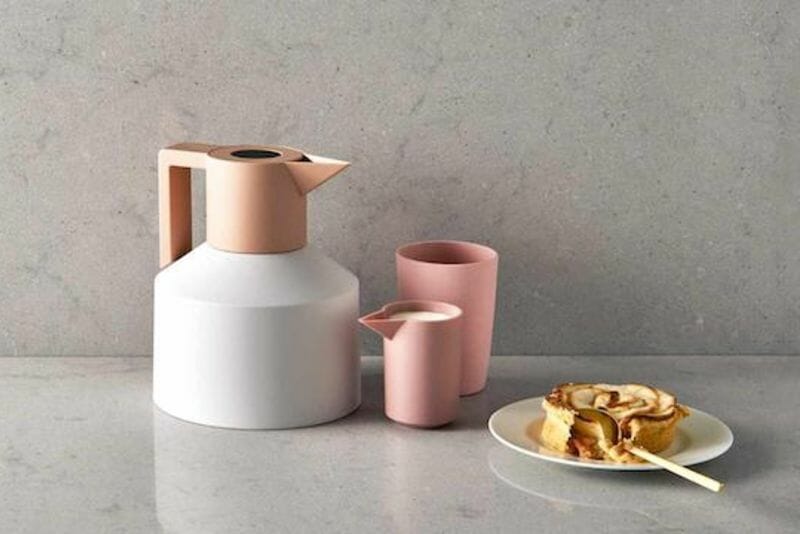
You read correctly a moment ago. Yes, you can get quartz that resembles marble. Two of our most popular colors for achieving this look are 51111 Statuario Nuvo and 5131 Calacatta Nuvo. Both of these are, of course, named after the popular types of marble.
But let’s say that in the process of looking for a marble countertop, you decide the aesthetic doesn’t actually fit into your dream kitchen like you thought it did. With quartz, that’s no problem. We offer stone slabs in a wide variety of styles. We have surfaces that look like concrete, granite, and much more. However your tastes develop during the countertop shopping process, we’ve got you covered.
Beyond the surface’s pattern itself, with quartz, you also have access to countless edge profiles.
Durability
As mentioned earlier, quartz is a nonporous material. This reduces the likelihood of permanent stains. Additionally, quartz is one of the hardest rocks on earth, ranking a 7 on the Mohs hardness scale. Marble, on the other hand, can rank as low as 3 on the scale and only as high as 5. This means marble will crack, scratch, and chip with much greater ease than the superior quartz.
Increased Home Value
Black and white marble countertops perform slightly better than average for natural stone when it comes to home resale value. Quartz, as the most desirable countertop material on the market, easily outpaces it, though.
Of course, there’s a lot that goes into home resale value. Generally, though, homeowners recoup as much as 100% of their quartz countertop’s value when they sell their home.
In Summary
Black and white marble countertops (particularly the latter) are among the most popular types of natural stone surfaces in kitchens and bathrooms. However, if you’re looking for the absolute best, go with a marble-style quartz surface.
It will offer greater durability, resale value, and aesthetics. You’ll also have a wider range of options as far as patterns and edge profiles go.
Check out our kitchen visualizer today to start experimenting with our various white marble quartz surfaces.
Frequently Asked Questions
How much do white marble countertops cost?
White marble countertops cost between $40 and $200 per square foot. That’s just materials, though. The price can get prohibitively high if you are looking for custom shapes, sizes, and colors.
Is marble recommended for kitchen countertops?
At Caesarstone, we do not recommend marble for kitchen countertops. The material is much more fragile and expensive to maintain than quartz, which offers a very similar look anyway.
Is marble more expensive than quartz?
People, on average, spend a similar amount of money upfront on quartz and marble. That said, marble will cost you more in the long run due to its need for maintenance and the cost of repairs should they become necessary.
